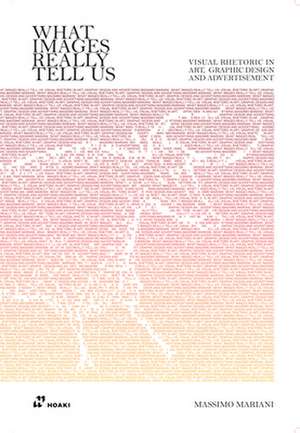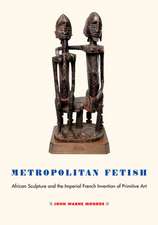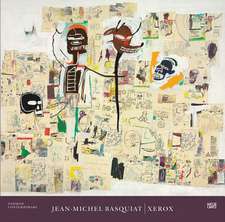What Images Really Tell Us
Autor Massimo Marianien Limba Engleză Paperback – 15 oct 2019
Preț: 149.78 lei
Preț vechi: 172.04 lei
-13% Nou
Puncte Express: 225
Preț estimativ în valută:
28.66€ • 29.82$ • 23.66£
28.66€ • 29.82$ • 23.66£
Carte disponibilă
Livrare economică 22-29 martie
Livrare express 08-14 martie pentru 65.94 lei
Preluare comenzi: 021 569.72.76
Specificații
ISBN-13: 9788417656041
ISBN-10: 8417656049
Pagini: 288
Ilustrații: colour illustrations
Dimensiuni: 172 x 246 x 21 mm
Greutate: 0.77 kg
Editura: HOAKI BOOKS
ISBN-10: 8417656049
Pagini: 288
Ilustrații: colour illustrations
Dimensiuni: 172 x 246 x 21 mm
Greutate: 0.77 kg
Editura: HOAKI BOOKS
Public țintă
ENGNotă biografică
Massimo Mariani, a graduate in painting at the Accademia di Brera, has exhibited in numerous galleries in Italy and abroad. He is a prolific author with many books published in Italian on such diverse topics as Freud and the subconscious, the representation of the feminine, detective stories and poetry.
Cuprins
INTRODUCTION: POETRY AND IMAGE
PART 1
THE TALE
THE IMAGES
CATALOGUE OF THE MAIN RHETORICAL FIGURES OF SPEECH
METALEPSIS: FROM THE VERBAL TO THE VISUAL
THE CHARACTER GESTURE.
CHARAKTERANALYSE AND THE ICONOLOGY OF CESARE RIPA
PART II
RHETORICAL ARTICULATION APPLIED TO NARRATION
THE GIALLO AND THE NOIR: TWO MODELS OF RHETORICAL NARRATION
BIBLIOGRAPHY.
PART 1
THE TALE
THE IMAGES
A LOOK AT PARTS OF SPEECH.
Nouns. Adjectives. Verbs. Direct objects.
RHETORIC AS VERBO-VISUAL ARTICULATIONCATALOGUE OF THE MAIN RHETORICAL FIGURES OF SPEECH
Metaphor. Metonymy. Synecdoche. Anastrophe. Syndeton. Hyperbole. Onomatopoeia. Pleonasm. Ekphrasis. Ellipsis. From collage to post-production an aside on surrealism and computers. Antiphrasis. Irony. An Election Entertainment. Canvassing for Votes. The Polling. Chairing the Member.
RECOGNITION AND RESEMBLANCE FOR THREE VOICESMETALEPSIS: FROM THE VERBAL TO THE VISUAL
Verbal examples. Visual examples.
MOSES AND THE INSURANCE COMPANY.THE CHARACTER GESTURE.
CHARAKTERANALYSE AND THE ICONOLOGY OF CESARE RIPA
PART II
RHETORICAL ARTICULATION APPLIED TO NARRATION
THE GIALLO AND THE NOIR: TWO MODELS OF RHETORICAL NARRATION
The plot of the giallo. The plot of the noir. Two points of view.
VERBO-VISUAL MODELS OF RHETORICAL FIGURESSeeing the ending. Closed ending. Open ending. Circular ending. Finding ideas and forms for a narrative plot. The visual, the verbal and the secret explained by Ernest Hemingway. Examples of analogy.
THE EMPORIUM OF IDEASNews, preferably about vicious crime. Conversations with friends or girlfriends, preferably nasty. Television, preferably trash. Character, preferably a bad one. The visible and hidden images of a plot.
THE RHETORIC OF THE CHARACTERThe character is introduced. The nature and the tone of the character. Dramatis persona and character. Well-rounded character. Blurred character. Linear character. Contrasted character. Static character. Dynamic character.
THE RHETORIC OF CONFLICT
Contrast and conflict in noir. Three examples of noir (visual and verbal).
THE SETTING AS A COLLECTION OF ELEMENTS HOSTING THE ACTION.The environment and the scene. A harmonic environment. A disharmonic environment. A harmonic and disharmonic environment together. The typified scene as opposed to the typical scene. The Cliffhanger. The Frame and the Dramatis Persona. The sublime vision. The disturbing vision.
DEFECTIVENESS AS A DEROGATION FROM ICASTIC REPRESENTATIONMetonymy: beyond the name. Antonomasia: against the name. Similitude: relative greatness. Antithesis: turning against. Reticence: omission, passing over in silence. Asyndeton: no connection. Metaphor: moving beyond, outside. Preterition: going beyond. Periphrasis: going around. Prosopopoeia: personification in excess. Hypotyposis: under effigy. Synecdoche: taking together. Exclamation: enunciating out loud. Hyperbole: simply exaggerating. Apostrophe: an action and its reversal. Oxymoron: the juxtaposition of opposites.
CONCLUSION.BIBLIOGRAPHY.
Descriere
This book is an account of how to use the images to deliver the intended meaning.






